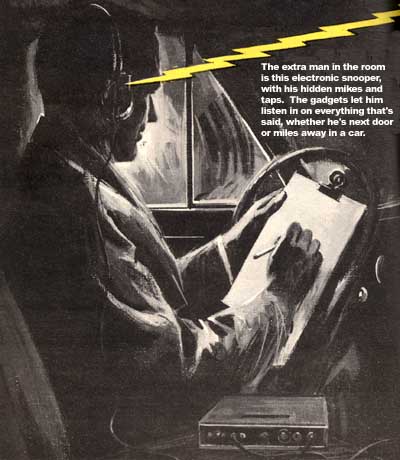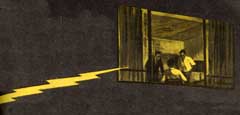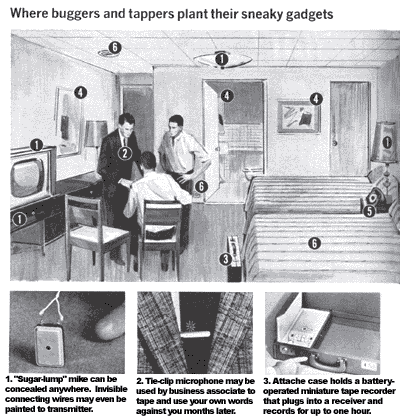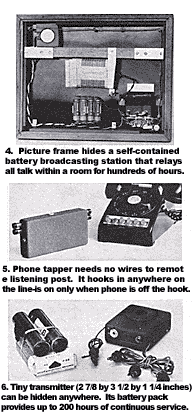 |
Are They Listening In on You?
Don't say a word until you've checked the picture frames, the telephone, and the crevices in the woodwork. Little electronic devices have big ears.

|

by E.D. Fales, Jr. (Popular Science, January 1965)
Next time you dicker for a car, be careful what you say when the salesman "steps out of the room" to let you mull it over. He may be listening with a hidden mike to every word you say to your companion.
Today the businessman you visit, or the salesman who calls on you, may be wearing a body mike or have a recorder hidden in a briefcase. Your conversation may be secretly "stolen" from you and played back later. This may be done for political purposes, to embarrass you with the boss, or as part of a "fishing expedition" for evidence (as in a divorce action).
|
|
You can be a victim of electronic snooping when you call your lawyer, the police, banks, or government agencies. In fact, as an average telephone user, the odds are that someone already has your voice on record.
Electronic snooping is mushrooming. More people than ever use illegal wiretaps and "bugs." Government agencies use them to catch criminals. Private individuals and some businesses use them to get the edge on competition, for plain "fun," or even for blackmail.
At Washington National Airport, not long ago, control-tower operators began hearing strange voices on the radio. The Federal Communications Commission was notified and promptly put tracer ears on the case. They discovered the mysterious source-a hotel room, five miles away. There two men were talking business, not dreaming that a tiny hidden radio was broadcasting every word.
In a nearby room, the FCC men found the talk being recorded by three "private eyes." All were arrested.
There are thousands of full-time wiretappers and buggers like them. Only a few are legitimate law-enforcement agents on the trail of criminals and armed with court orders. The majority are police operating illegally, private eyes, blackmailers, employers, political spies-or just busybodies.
Here's the weird arsenal of electronic devices they use:
The big ear. A snooper can aim this inexpensive gadget at a neighbor's open window, at an outdoor group chatting on a patio, a foursome of golfers, a competitor's business place, and hear everything within 400-foot range. He can even plug in a tape recorder.

The teacher trap. Some school kids now use an inexpensive tape recorder, hidden in a pocket.
"I could get our physics teacher's license taken away tomorrow if I wanted to," one Midwest high-school student told Popular Science. "He jokes with us in class and I've recorded a lot of things he's said that the Board of Education wouldn't like. But why be mean?"
The principal, too, can eavesdrop, via hidden microphones in the public-address system, on any classroom without knowledge of teacher or pupils. This is done "to be sure the teacher says the right thing."
Talkie pictures. Snoopers can buy a nice, ordinary-looking framed picture. No one would ever suspect that its frame contains a tiny mike that is a broadcasting station.
The picture can pick up your most casual comments and transmit them to a parked car a block away.
"Sugar-lump" mikes. These tiny devices can be hidden in drapes, lamps, flowerpots, or even TV sets.
Cigarettes that "hear." A snooper may offer you a cigarette, then put the pack (and the transmitter you didn't notice in it) back in his pocket. Your conversation is broadcast to a hidden confederate up to 1,200 feet away.
The bugged man. There's a little wire recorder that goes under the snooper's shirt. The mike is in a wristwatch, tie clasp, or pen.
Hairy "ears." These devices include a wire so thin you can't see it when it's varnished into the woodwork. It can be connected to a mike hidden in a wall.
The "spike." Another gimmick is the "snooper's spike," a 12-inch steel nail that can be attached to a tiny mike hooked to an amplifying circuit. The snooper drives it against a pipe system or, best of all, a metal heating duct behind a baseboard. It picks up everything said from basement to bedroom.
In some cities snoopers don't even bother with wiretapping. They merely bribe someone in the phone exchange to pipe your calls into their lines.
New wonders. Recently the communists bugged our Moscow embassy by aiming a beam at a tiny reflector embedded in our Great Seal itself. Today we, too, are developing such devices-using microwave, ultrasonic, and even laser beams.
If a room is silent, a microwave beam will bounce back unchanged from any reflector. But if people are talking, the reflector vibrates and the return beam is changed, or modulated. Words spoken in the room now can be read off the beam by suitable receivers.
Snoopers using laser and microwave devices no longer need wiretaps. "I can sit in this car now," one told me, "and pick up a conversation from any window we can see." Sometimes the window itself, or a door, can be used as a vibrating reflector.
All this might be considered merely freakish or funny-if electronic eavesdropping had not suddenly become a threat to individual privacy.
Investigators recently reported finding microphones hidden in the toilet-paper rollers in one company's washrooms. A so-called "security man"-current term for company detective-could, by throwing a switch, monitor 10 toilets at will.
Yet all this is legal in most states. No law forbids a man to record your voice without permission-except for one federal law about telephone wires. This statute has been violated by police and federal agencies so often that they are reluctant to jail private individuals who do it.
In one of the few arrests made since wholesale eavesdropping began, a prosecuting attorney was arrested on a charge of using tape-recorded conversations in a blackmail attempt. In another recent case, a county official in a southern state was arrested for tapping his employees' phones-as hundreds or even thousands of U.S. companies now do, often with the help of telephone-company employees.
Congressional investigators have heard that as many as 5,500 "snooper buttons" have been used by federal employees in Washington, D.C. A snooper button lets an employee record your voice when you call a federal agency. Some use regular extension phones. Others use transmitter cutoffs that allow listening in without clicks, loss of volume, or introduction of background noises.
How a snooper wiretaps your home. Here's how Samuel Dash, former Philadelphia district attorney and expert on wiretapping, describes it in his book, The Eavesdroppers:
Your telephone wires (called your "pair") lead to a pole near the house which has a junction box where they feed into a main cable. A wiretapper climbs the pole, flips open a junction box and looks inside. He may see 20 sets of terminals. He plugs his own small handset telephone into two of the wires, dials your number, spits on his fingers, and holds them across the terminals. If nothing happens, he's got the wrong line.
So he tries another pair. When his fingers tingle with a small shock, he knows he's rung your phone and pinpointed your pair. He quickly disconnects. Or, if you hear the ring and answer quickly, he may say: "Repair service; just testing."
He may have a confederate at a listening post in a nearby house. If so, he merely connects that house line to yours. His accomplice is now ready to hear and record any calls you make or get. He may even have a gadget that tells him what numbers you dial. Or he can string a wire three or four blocks to his parked car and run the wires down a pole into the car.
He could use a headset, but some neighbor might become suspicious, so he hooks the wires into his car radio.
How an office is wiretapped. One method is to have the switchboard girl plug an "executive override" extension to your line-so the company snooper can listen in or make a recording. If you ever try to signal your operator and can't get her, it may be because that sneaky extension circuit was improperly installed and is open.
Sometimes a wired or wireless bug may be concealed far back in a drawer where you never look. Anything you say is transmitted to a receiver in another room.
Your calls can also be tapped by a snooper who has access to the terminal box in the basement of your building. There he merely plugs another line into yours with a patch cord, or "loop."
One freelance wiretapper, whose clients included racketeers and movie greats, says that most companies would not dream of wiretapping their employees. But others, less scrupulous, do. One millionaire businessman boasts, "I record every call I make or get."
If you don't like snoopers around your house or office, here's what you can do:
1. Rent or borrow a small mine detector. These are readily available from supply houses that serve the building industry. They are also used by experts who call themselves "anti-intrusion specialists." A mine detector will change the pitch of its sound when passed near a wired mike.
2. Buy a small used neon sign and turn it on near your phone when you talk. A snooper will hear nothing but the loud buzzing radiated by the sign's transformer. This works only with an induction coil, not with a wired tap.
3. To detect a wireless mike, you can use a special FM set turned to 74 megacycles. A squeal is your tip-off. Leave the set on to jam the FM channel.
4. Talk quietly and turn on a nearby radio set-fairly loud, to balk wireless mikes. Today's snooper devices can eliminate certain interfering tones, but these tricks still work. So does the business of letting water run in a shower.
5. Call the phone company if you see a suspicious man working on a pole or near your wires. If a repairman comes to your door, check with the phone company before admitting him. (Credentials are easily faked.)
6. Check with the phone company if you hear your phone ring and a voice says, "Just checking."
7. Notify your phone company, the FBI, the FCC, or any other law-enforcement agencies if you hear persistent "funny sounds." These sometimes occur in stormy weather but shouldn't persist. A good telephone line is silent. Strange scratchings, an echo, or odd delays are a tip-off of a tap.
So are faint voices. These used to be caused by induction from other wires. But today's lines are better. Such sounds are sometimes caused by an imbalance in the circuit, due to unskilled wiretapping.
8. If you're a top-secret man, you can buy a portable telephone conversation scrambler for about $275 a set. It's held against the phone and changes your voice into unintelligible sounds that can only be unscrambled by a matching device.
|






